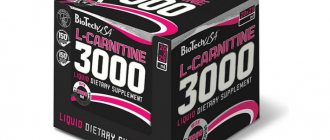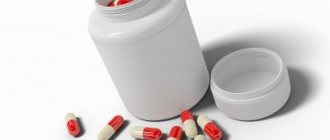Sports nutrition for beginners
Before we dive into all the supplements in detail, it is important to note some sports nutrition tips. You shouldn't compare yourself to professional athletes. The cabinets of some of them are filled to capacity with various additives that differ from each other in their effects. They use so much sports nutrition because their bodies have already achieved maximum results, and it will be impossible to surpass it with just simple food. Sports nutrition for a beginner should only serve as a support, and you should not focus on it.
Protein or gainer?
All beginners, without exception, have a reasonable question at first: where to start taking sports nutrition? It's actually quite simple here. The main goal of any gym goer is to gain muscle mass. And nothing can cope with this task better than a gainer or protein. Choosing between them is the first stage in introducing novice athletes to sports nutrition.
Gainer and protein, although they perform the same function, differ from each other not only in composition, but also in their principle of action. Gainer is a complex supplement that contains a large amount of fats, proteins, and carbohydrates. In addition, it often includes vitamin and mineral complexes, additional components to improve digestibility and other ingredients. It is distinguished by its high calorie content, often high sugar content, and large portions. Gainers are best suited for those who have trouble gaining weight or are naturally thin. With its help, total body weight is gained, which is what we need at first.
Protein, on the contrary, contains a minimum of ingredients, and is presented in the form of one type of protein (usually). We won’t go into detail about each type of protein, let’s just say that it is necessary for gaining pure muscle mass. These supplements are low in calories, rarely contain additional ingredients, and are easily absorbed by the body. They are best consumed by those who have a fuller physique, or those who want to gain only pure muscle mass.
Sports nutrition for beginners should start with these two supplements - they are the main ones in terms of weight gain.
Reasons to avoid supplements when you first start exercising
When a person just starts training, his body gradually rebuilds and uses up existing resources. For this reason, there is no need to add large amounts of nutrients. The loads in the first stages are not too high, calories are burned within normal limits, and there is no need to constantly replenish the body.
First, you need to consult a trainer or specialist in this field; he will be able to suggest the features of a particular type of sports nutrition, and will also inform you about contraindications for use.
Protein
For those who are involved in professional sports, the process of muscle recovery after intense exercise is the most important thing. The consumption of the required amount of protein depends on the person’s weight and the intensity of training, for example, 100 kg will require 330 g of protein mixture, 60 g of protein is recommended for a weight of 50 kg. The daily intake rate for an adult is about 1.5-2 g/kg body weight.
Types of protein:
- Egg.
- Soy.
- Whey.
- Casein.
Protein is responsible for building muscles and gaining weight. Physiologically, human muscles are composed entirely of protein. For this reason, it is imperative to include protein in your diet if you want to achieve visible results. Protein is a type of sports supplement that will provide muscle growth.
Gainer
Gainer comes from the English word to receive – gain. During grueling workouts, the muscles begin to ache. This is due to the fact that the body begins to experience a lack of ATP and CP, energy, etc. The gainer is aimed at restoring energy reserves and is intended for athletes who strive to gain maximum muscle mass. It is best to use this sports supplement after training to restore the normal amount of carbohydrates in the body.
One serving of gainer, depending on the manufacturer, may contain 20-40 g of protein and 50-80 g of carbohydrates. Manufacturers recommend adding a gainer to your diet once a day. You can distribute the daily norm of 100-150 g evenly into 5-7 meals during the day.
Gainers contain high-quality proteins and quickly digestible carbohydrates, fats, as well as enzymes that are responsible for the productivity of the gainer. Manufacturers of sports nutrition advise consuming gainer once a day. The average daily intake for an athlete is from 100 to 150 g, depending on weight and load.
An active supplement for athletes, the main task of which is to increase muscle volume.
Isotonics
Isotonics are a solution of electrolytes. They will nourish the muscles with the necessary energy. Most often they are used by athletes during training.
Main components:
- Water.
- Carbohydrates.
- Electrolytes.
- Potassium.
- Magnesium.
The main task of isotonics is to restore the water-salt balance in the athlete’s body. This drink can solve several problems - dehydration and hyponatremia.
They help quench thirst, maintain energy balance, and restore microelements.
When exhausted, the human body begins to release cortisol. It begins to consume energy by breaking down muscle protein into glucose. In this regard, monitoring your energy during training is very important!
With a normal level of glycogen, the human body recovers much faster, and energy exchange improves. Suitable for people with excess body weight, provided that they consume isotonic drinks only during training.
Vitamin and mineral complexes
Why is it necessary to use complexes:
- Constant stress that the body experiences under heavy loads requires a supply of vitamins and minerals to restore energy; if the required amount is not available, immunity will begin to decline.
- To produce enzymes, such as digestive enzymes, the body requires vitamins and minerals.
Vitamins are divided into two large groups - water-soluble and fat-soluble.
The first group is vitamins B and C.
The second group is A, D, E and K; in case of excess, they cannot be excreted through the urine, but are deposited in subcutaneous fat.
The complex is recognized by athletes as practically the most important part of nutrition. For the most part, people focus on the ratio of proteins, fats and carbohydrates, as well as energy metabolism, and completely forget about the benefits of vitamins and minerals, which are responsible for the digestibility of all other substances. Vitamins are the keys to the normal functioning of the body; they are responsible for almost all vital processes.
Amino acid complexes
There are chemical compounds in the body that take part in various processes, for example, they group protein compounds, nourish and build muscle tissue - these are amino acid complexes.
These are complexes aimed at normalizing the metabolic process in the body and promoting maximum absorption of nutrients consumed by the athlete. Also, amino acid complexes prevent the appearance of fat.
The most popular amino acids among athletes are the BCAA group, which consists of:
- Leucine.
- Valina.
- Isoleucine.
Their main task is to restore muscles after overload. Read more about sports nutrition for post-workout recovery here.
Types of amino acids:
- Replaceable.
- Essential, it is necessary to supply the body with them, since they are not produced independently, for example, histidine.
- Partially replaceable.
Interesting fact! 22 amino acids are responsible for normal metabolism, 9 of this group cannot be produced in the human body and can only be obtained through food.
Creatine
Photo from nersport.com
This is one of the amino acids that is responsible for preserving and reserving energy in the athlete’s muscle tissue. It also promotes the accumulation of ATP - adenosine triphosphate, which increases the body's endurance.
Creatine is aimed at increasing muscle mass, as well as increasing aerobic and anaerobic endurance. Practical research shows that creatine promotes longer and more intense workouts. It prevents the formation of the well-known lactic acid and restores the body. Interestingly, with the help of creatine you can achieve significant results in a minimum period of time.
For a body weight of 70 kg and moderate intensity exercise, manufacturers recommend taking about 2 g of creatine.
L-carnitine
A sports supplement that actively breaks down fats, it is also called a miracle remedy against fat. The human body produces L-carnitine, one dose is insignificant and does not contribute to achieving the desired result. For this reason, chemists artificially synthesized this substance. The main property of levocarnitine is the breakdown of fat. During this process, energy is generated that helps increase a person's endurance.
Remember! L-carnitine is not a super remedy that will solve all problems and create an ideal figure for you; the basis is always proper nutrition and intense physical activity.
Fat burners
These sports supplements consist of substances that cause adipose tissue to transfer fats into the bloodstream. They influence the muscles, activating their performance. The energy released oxidizes fat deposits, and the breakdown process begins. A significant advantage is that fat burners affect not only the fat layer, but also help optimize the workflow of such important systems as:
- nervous;
- cardiovascular;
- respiratory, etc.
Kinds:
- Diuretics are aimed at removing water from the body.
- Thermogenics – increase the temperature in the body.
- Appetite suppressants.
- Fat burning components.
Attention! Strong fat burners have strong side effects; before taking them, you should consult a specialist.
BCAA or complex amino acids?
Our body contains very interesting substances – amino acids. They perform a variety of functions in the body, and without them normal life activity is impossible. In fact, protein in the body is not the final product. During the process of breakdown, it is transformed into amino acids, from which the muscles of our body are built. But what, then, is the difference between BCAA and complex amino acids and how to choose sports nutrition for a beginner?
There are several differences between them. Firstly, complex supplements also contain BCAA, but in much lower concentrations. The main function of BCAA is to maintain and increase muscle mass, as well as reduce the percentage of body fat. Complex amino acids are more tuned to maintain a positive amino acid and energy balance in the body. Therefore, it is impossible to say unequivocally which sports nutrition is better for a beginner of these two. In this matter, everyone must decide for themselves, focusing on their goals.
Learn all about BCAA powder as the most convenient form of essential amino acids!
Main conclusions
- Before you start taking sports nutrition, you need to collect all the information about it and consult with a specialist.
- Start taking sports nutrition after a long period of training, and not from the first days of training.
- Determine your body type based on this information and purchase a certain type of supplement.
After consuming sports nutrition, changes will begin to occur in the body: relief will appear, muscle mass will increase, the layer of fat will decrease, energy will increase, metabolism will normalize, the immune system will strengthen, and endurance will increase.
Reasonability and balance are the key to success; excessive use of sports supplements can negatively affect your health.
Read about the benefits and harms of sports nutrition in our article.
Vitamins and minerals – only a complex!
To support vital processes, the body uses energy obtained from food. But the body will not function properly if it does not have a sufficient amount of vitamins and minerals. These substances participate in absolutely all internal metabolic processes, and also affect the processes of growth, development, respiration, hematopoiesis, and so on. Therefore, if you are interested in what kind of sports nutrition a beginner needs, then vitamin-mineral complexes are definitely what should be in your arsenal! Here we can say even more - they are necessary for any person, even those who do not play sports.
Athletes need these substances in increased quantities. During heavy physical work, all internal processes accelerate. Accordingly, the consumption of vitamins and minerals also accelerates. In addition, some minerals leave the body with sweat, and due to their lack in the body, many negative processes can occur.
Sports nutrition tips
Sports nutrition for beginners – what to look for? First you need to decide what goals you are pursuing. Most inexperienced athletes, already in the first days of training, try to extract from experienced bodybuilders the “secrets” of quick pumping, and what kind of sports nutrition is needed for this. As a result, having heard a lot of useless advice from a “pumped up” but uninformed athlete, beginners go to stores and waste money. And the first advice for beginners will be a recommendation - forget about all the “miracle” methods! Of course, sports nutrition will help you achieve your goal. But here the emphasis is on the word “help”. It won't do all the work for you. If you want to get the body of your dreams, then be prepared to spend more than one, or even two years on it. And only then will you be able to see real results.
Go ahead. Never, under any circumstances, call sports nutrition chemicals. In fact, all sports nutrition is regular food. Not quite ordinary, but food. Sports nutrition is a concentrated form of everything you consume in your diet. And all this is obtained from organic and natural sources. Sports nutrition has some advantages over regular food, but it will never completely replace natural food! Therefore, remember rule No. 2 - sports nutrition is food that should be eaten in moderation.
What You Need to Know Before Taking Any Supplement
If you've just recently started lifting weights, figuring out where to start and how much money to spend can be challenging. You need to be sure that your nutrition and training are designed in such a way that the supplements will get the maximum benefit.
A beginner should not train with weights more than four days a week, and the workout should last no more than an hour. Resting is what you need to allow you to achieve the results you want, while overtraining, on the contrary, will not allow you to do this.
Nutrition for strength training is not the same as dieting. You need to increase the number of meals per day, not three, but closer to seven or eight small portions. Here are beginner tips for growing muscles. Protein intake is critical for bodybuilders, so make sure you get at least 20 grams of protein in each serving, even on rest days.
What additional sports nutrition should a beginner take?
Once you are quite comfortable in the gym, learn how to do the exercises correctly, and your first muscle mass begins to appear, then you can start thinking about other wonders of sports nutrition. There are several other sports supplements that have proven to be effective and work well for certain purposes. So let’s look at which sports nutrition is better to take extra for muscle growth...
Creatine. This is one of the cheapest, but at the same time effective aids for athletes. It performs several functions at once - it increases strength and endurance, and also has an indirect effect on the growth of muscle mass. Creatine is a substance that can be independently synthesized by the body, but in insufficient quantities. Taking it additionally will only enhance its effectiveness and have a positive effect on the general condition of your body. It makes explosive training much easier and gives you more strength during training.
Pre-workout complexes. They often contain creatine, stimulants and other ingredients. Their effect is that they allow the body to use additional sources of energy during training, and also stimulate the central nervous system. As a result, your brain thinks that you are not tired longer and that you still have a lot of energy for training.
Nitrogen donors. Their effect is that they dilate blood vessels, due to which the muscles visually increase.
This allows more blood and nutrients to pass through the vessels, which also improves muscle recovery.










